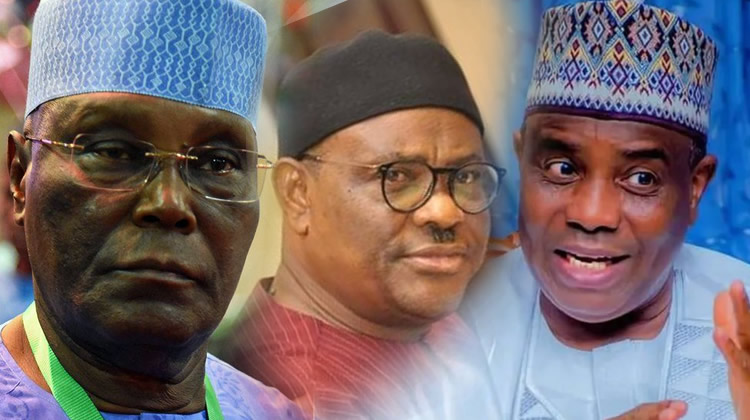The political landscape in Nigeria is often characterized by shifting alliances, ideological clashes, and accusations of betrayal. A recent public exchange between Nyesom Wike, the Minister of the Federal Capital Territory, and former Sokoto State Governor Aminu Tambuwal, highlights these dynamics. Wike, in a televised interview, launched a scathing attack on Tambuwal and former Vice President Atiku Abubakar, accusing them of political inconsistency and prioritizing personal gain over loyalty and principle. This public spat stems from the fallout of the 2023 presidential election and exposes deep-seated grievances within the Peoples Democratic Party (PDP).
Wike’s central accusation revolves around what he perceives as Tambuwal and Atiku’s history of political maneuvering and opportunistic party-switching. He questioned Tambuwal’s professed loyalty to Atiku, emphasizing that true leadership should not come at the expense of personal relationships. Wike alluded to Tambuwal’s alleged ambition for a Senate seat had Atiku won the presidency, framing it as further evidence of his self-serving political calculations. He characterized both men as “consistently inconsistent betrayers,” suggesting a pattern of abandoning allies and principles for personal advancement.
Tambuwal, in an earlier interview on the same program, had defended his allegiance to Atiku, asserting that his political decisions were driven by ideology and national interest, not personal friendships. He emphasized his respect for both Atiku and Wike, claiming his disagreements with various political figures stemmed from principled stances on governance, not personal animosity. He cited his past disagreements with former President Goodluck Jonathan as an example of his commitment to ideology over personal relationships, highlighting his departure from the PDP to the APC at the time.
This public exchange reveals a deeper rift within the PDP that dates back to the 2023 presidential primaries. Wike had openly criticized Atiku, Tambuwal, and Bukola Saraki for allegedly undermining the party’s zoning arrangement, which could have favored a Southern presidential candidate. Wike’s resentment likely stems from his own presidential aspirations and his perception that these key figures within the PDP betrayed an unwritten agreement to rotate power between the North and South. He also pointedly reminded viewers of his past support for Tambuwal’s speakership bid, contrasting his own loyalty with what he sees as Tambuwal’s subsequent betrayal.
Tambuwal, in his defense, attempted to delineate between political disagreements and personal relationships. He insisted that his political stances should not be interpreted as personal attacks, emphasizing that he maintained cordial relations with those he disagreed with politically. This attempt to separate the personal from the political, however, appears to have done little to assuage Wike’s anger and accusations of betrayal. The public nature of this dispute underscores the deep divisions within the PDP and suggests lingering tensions from the 2023 election cycle.
This exchange between Wike and Tambuwal offers a glimpse into the complex dynamics of Nigerian politics. It highlights the importance of personal relationships and perceived loyalties in a political system often characterized by shifting alliances and strategic maneuvering. Wike’s accusations of betrayal and inconsistency underscore the fragility of political partnerships and the enduring impact of past grievances. While Tambuwal attempts to frame his choices as principled and driven by national interest, Wike’s perspective paints a picture of political opportunism and self-interest.
The fallout from the 2023 elections continues to reverberate through the PDP, and this public spat between Wike and Tambuwal exposes the raw emotions and lingering tensions within the party. Whether these divisions can be healed remains to be seen. The accusations of betrayal and inconsistency, however, suggest a deep-seated mistrust that could continue to shape the political landscape in the lead-up to future elections. The public nature of this dispute also serves as a reminder of the importance of managing internal party dynamics and the potential consequences of perceived betrayals in the highly personalized world of Nigerian politics.














